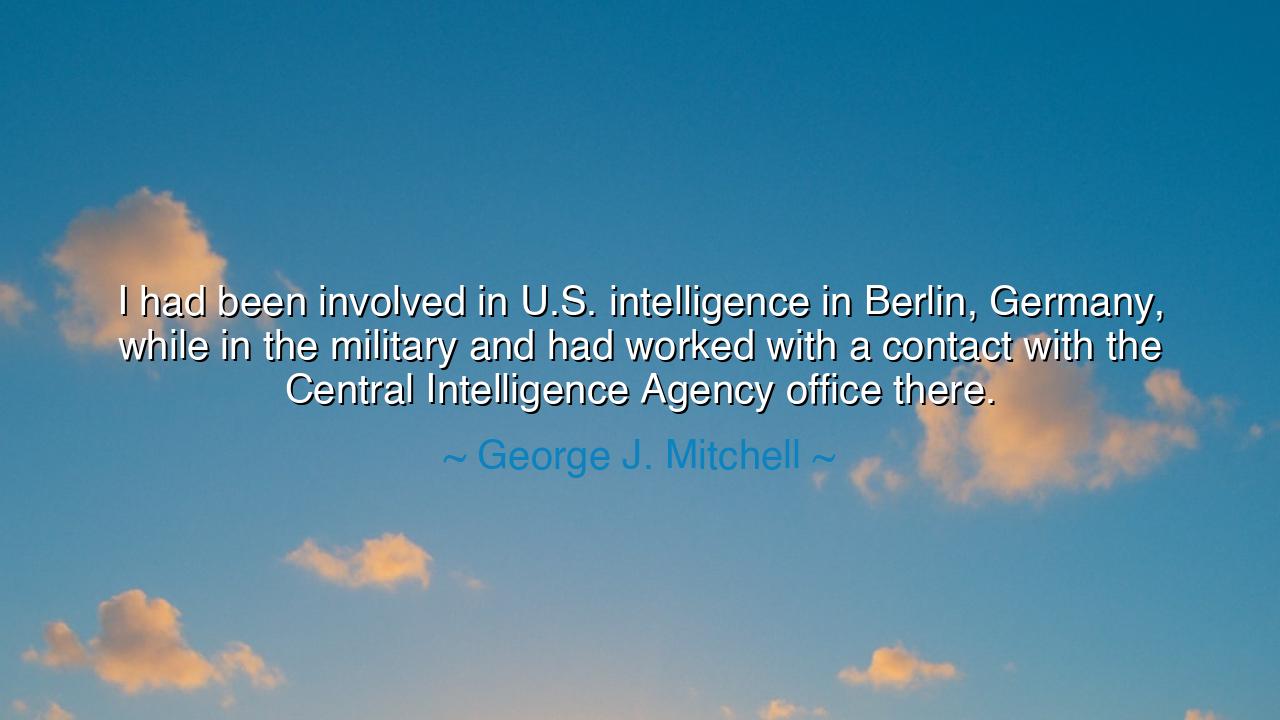
I had been involved in U.S. intelligence in Berlin, Germany
I had been involved in U.S. intelligence in Berlin, Germany, while in the military and had worked with a contact with the Central Intelligence Agency office there.






When George J. Mitchell reflected, “I had been involved in U.S. intelligence in Berlin, Germany, while in the military and had worked with a contact with the Central Intelligence Agency office there,” he was not merely recounting a chapter of his past; he was unveiling a glimpse into a world of quiet vigilance—an era when knowledge was power, and silence itself was a weapon. His words carry the gravity of a man who once stood at the threshold of history, serving not for glory or applause, but for the unseen preservation of order in a world trembling between freedom and fear. This statement, simple in tone yet profound in essence, embodies the eternal tension between duty and secrecy, between what is known and what must remain hidden.
To understand the origin of this quote, we must step back into the years following the Second World War—into the divided heart of Berlin, a city carved into zones of ideology and power. There, amid the rubble and rebirth of nations, the Cold War began to take shape. The United States, wary of the rising shadow of the Soviet Union, built networks of intelligence to guard against tyranny’s return. Young officers like Mitchell found themselves not on battlefields of blood, but in battles of information and will. Every whisper, every coded message, every quiet meeting was a thread in the tapestry of survival. In such work, courage took a different form—it was not loud or visible, but patient, precise, and bound by the sacred vow of duty to truth.
Berlin was no ordinary city then. It was the eye of the storm, where two worlds faced one another—the democratic West and the iron East. The Berlin Wall had not yet risen, but the division was already etched deep in spirit and purpose. Those who served there, like Mitchell, were part of a silent brotherhood who understood that peace is not merely maintained by armies, but by vigilance of mind. They were watchmen on the frontier of freedom, where a careless word could endanger nations and a single act of integrity could preserve the balance of power. His cooperation with the Central Intelligence Agency reveals a truth about that era: that victory in the age of ideology depended not on might, but on the wisdom and integrity of those who sought knowledge for peace.
Throughout history, the wisest leaders have known that intelligence and discernment are the twin pillars of stability. Consider Odysseus, the cunning hero of Homer’s epic, who triumphed not through brute force but through the power of mind and patience. Like those who served in postwar intelligence, Odysseus understood that foresight is greater than strength, and that those who know how to wait, listen, and observe are often the true architects of destiny. Mitchell’s recollection, though spoken humbly, belongs to this same lineage—the lineage of those who defend not only with arms, but with understanding.
Yet within his statement lies a deeper lesson still: that every act of service, even one performed in shadows, is bound by moral responsibility. Intelligence, if divorced from conscience, becomes mere manipulation; but when guided by principle, it becomes a guardian of justice. Mitchell, who would later emerge as a statesman and peacemaker, understood that the skills learned in secrecy—patience, discernment, restraint—were not tools of deceit, but instruments of peace. His later work in brokering the Good Friday Agreement in Northern Ireland was a testament to this transformation: the soldier of shadows became a builder of peace.
So what, then, should we learn from his reflection? That in every age, there are those whose duty calls them to unseen service, where recognition is absent but purpose is sacred. These are the souls who stand watch in silence, whose faith in truth outweighs the hunger for fame. Their work reminds us that greatness is not always loud—it is often quiet, unseen, and done for the sake of others. In the world of intelligence, as in life, the truest strength lies not in domination, but in wisdom, humility, and the courage to guard what is right.
Let these words, then, be carried forward as a teaching: Seek knowledge not for power, but for understanding; serve not for recognition, but for the good of all. Whether in times of war or peace, live as Mitchell did—devoted to purpose, guided by integrity, and mindful that even in the smallest acts of vigilance, one may shape the destiny of nations. For those who walk in the shadows with honor bring light to the world, and through their unseen labor, the fragile balance of humanity endures.






AAdministratorAdministrator
Welcome, honored guests. Please leave a comment, we will respond soon